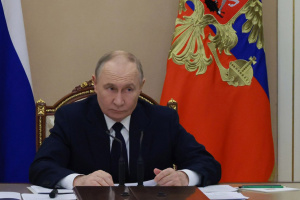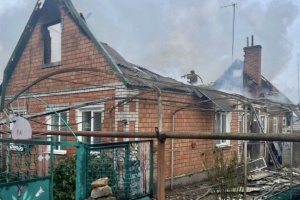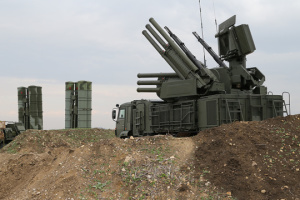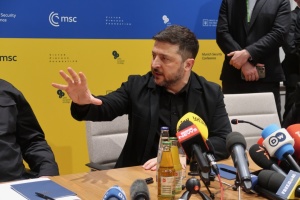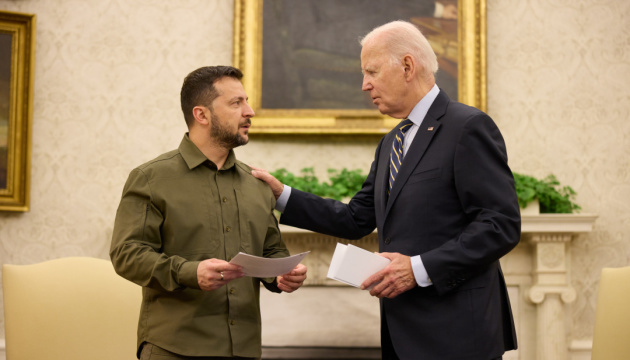
Agreement on joint arms production is better than ATACMS
Volodymyr Zelensky's overseas visit, which lasted from September 18 to 24, has come to an end. It was intense. During the week in New York, the President of Ukraine managed to speak at the 78th session of the UN General Assembly and at a meeting of the UN Security Council, where he explained the essence of the Peace Formula to the international community and called for reform of the Organization (read more about the UN, proposals for reforming this organization and Zelensky's "three steps" in our previous article). After that, the Head of State visited Washington. At the Pentagon, he discussed further military cooperation between the United States and Ukraine, spoke at a closed session in Congress, and met with President Joe Biden. Separately, he spoke with the patriarch of American foreign policy, Henry Kissinger, who turned 100 (!) years old in May of this year. Finally, after the roller coaster, he made an unannounced visit to neighboring Canada, where he met with Prime Minister Justin Trudeau and delivered a speech to the country's parliamentarians.
What were the results?
Actually, the president summarized them himself, so let's quote him: "Defense packages. From the United States, we received artillery, necessary shells, missiles for HIMARS, missiles for air defense, additional air defense systems, tactical vehicles, and some other types of weapons that will make themselves known on the battlefield. In addition, we have a historic decision to jointly produce weapons and defense systems, including air defense, between Ukraine and the United States. This is something that was an absolute fantasy until recently. But it will become a reality. We will make it a reality. As for the meeting in Congress, the support for Ukraine will continue. We have a decision from Canada on long-term defense support. The amount is half a billion US dollars."
Among the economic agreements, Zelensky noted the decision on a free trade zone with Canada. "In Washington, a memorandum of cooperation in the energy sector. In Ottawa, an agreement on the restoration of the Kakhovka hydroelectric power plant and the reconstruction of the Kaniv hydroelectric power plant. There is an obvious interest of large companies from both the US and Canada to work in Ukraine. At the level of the Ministry of Strategic Industry, there is mutual understanding with defense companies," the Head of State emphasized.
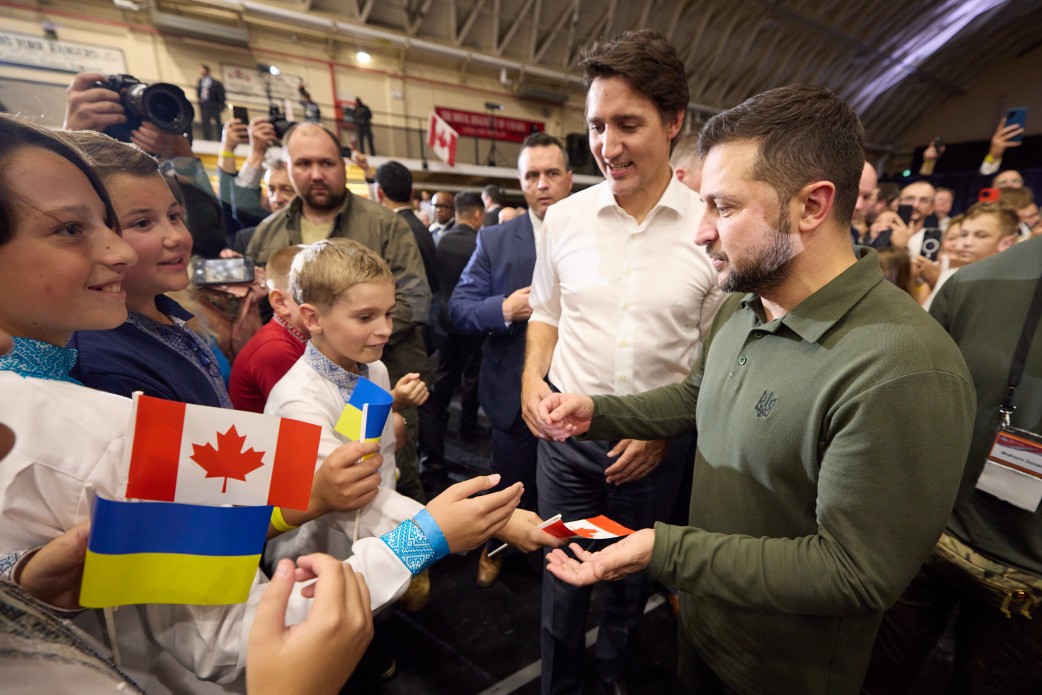
Overall, we can conclude that the visit was a success for Zelensky in particular and Ukraine in general. But is this really the case?
Some believe that the visit revealed unpleasant things: the "dancing" around the transfer of ATACMS continues, statements have been made, for example, by one of the US presidential candidates from the Republican Party, Ron DeSantis, against Ukraine's membership in NATO, and there has been a certain "cooling of relations" with the US administration. As for the UN, the expectations for changes in this useless organization have allegedly not materialized...
But others say that the visit was, if not 100% successful, then productive for our country.
How can we objectively evaluate this visit, and to what extent were expectations met? Separately, what about the joint US-Ukrainian arms production, and what can it result in? Finally, what does a series of interesting meetings between the president and Henry Kissinger and the chairman of the Sudan's Sovereign Council, Abdel Fattah al-Burhan, at the Irish airport in Shannon, indicate?
There are many questions, so let's find out.
In general, the visit was productive, although it took place in difficult conditions from the point of view of American policy
Political expert Yevhen Savisko emphasized in a commentary to Ukrinform that there is no "cooling of relations" between Ukraine and the United States.
"This is a fake by Russian and some conditionally Ukrainian politicians. The two presidents had a working meeting, exchanged views, and coordinated a common line of behavior on various issues. Arms and military assistance are only a part of them. ATACMS will be transferred to the Armed Forces of Ukraine, perhaps a small batch at first, but it is only a matter of time. This was the case with other types of weapons - Javelin, HIMARS, and howitzers. Politics and war are inseparable, whether we like it or not, but it has been so, it is so, and it will be so. Especially in the United States a year before the presidential election."
Domestic politicians should be restrained and understand that Ukraine is not yet the center of the universe, and partners have their own problems and political situations.
"Therefore, Volodymyr Zelensky's visit can be considered successful. There was no negative feedback. At the UN General Assembly, for example, we gained a new ally, Albania, and put the Russian delegation in its place. We could not have hoped for more," added Mr. Savisko.

International expert Oleksandr Yusupov believes that the visit was difficult but also productive. He drew attention to the fact that this time, unlike in 2022, President Zelensky was not allowed to speak at a joint session of Congress. The atmosphere during the press conference with the American president was not as positive as last year's, against the backdrop of the de-occupation of Kherson.
"However, according to American and European media reports, Biden still promised to transfer long-range ATACMS missiles, and meetings with congressmen and senators showed quite high support for Ukraine," the political scientist says.
Washington remains Kyiv's main donor, outstripping all EU capitals combined, and will definitely continue to provide large-scale funding for this year and next. But what happens next is a much more complicated question.
"The potential victory of Trump or a politician like him would not mean that Ukraine would lose US aid, but it could be significantly reduced, so visits of Ukrainian top officials to Washington are extremely important to maintain a dialogue with members of Congress and lobby for our interests. The main problem for Kyiv remains Biden's general approach to the war between Russia and Ukraine - not letting Ukraine lose. Instead of letting Ukraine win," Mr. Yusupov emphasized.
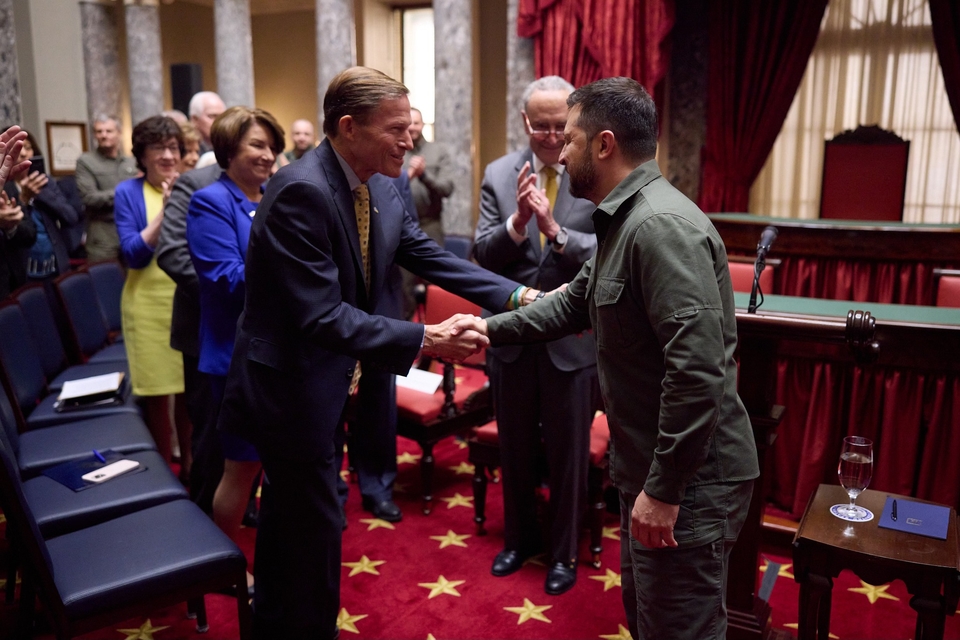
Political analyst Oleh Posternak says that relations between the United States and Ukraine have repeatedly resembled and will continue to resemble a sine wave. And this will be influenced by many circumstances: the 2024 election campaign, the course of hostilities on the frontlines, the behavior of China and the EU, and the effectiveness of anti-corruption policy in Ukraine.
"The latter factor is beginning to sound in the tone of bilateral relations with renewed vigor, and in a way, the meeting between Biden and Zelensky on a productive note was made possible by the President of Ukraine's reasonable anti-corruption approach to rotating the leadership of the Defense Ministry," the expert comments.
In general, in world diplomacy, a separate meeting against the backdrop of multilateral events is a sign that the positive dynamics of relations are maintained. For comparison, Biden did not hold such a meeting with Israeli Prime Minister, although the Israeli side expected it. The reason could be the attitude to judicial reform in Israel.
"Ukraine had several goals during Zelensky's visit to the United States: To demonstrate the strength of US-Ukrainian relations, the dynamics of which are relied upon by other Western countries, the EU, and NATO; to advance in the military aid nomenclature by obtaining a positive decision on long-range ATACMS missiles; to maximize bipartisan support for Ukraine in both houses of Congress and to reduce skepticism about further military aid to Ukraine, which is being fanned in America during the pre-election phase," Mr. Posternak lists. - "It is difficult to assess whether Zelensky has succeeded in dispelling the fears of American politicians about the futility of military aid to Ukraine and the fears of an endless war that will require the depletion of US domestic resources. This is the main challenge for Ukraine right now. Unfortunately, public support for Ukraine in the war revolves around media-highlighted expectations of spectacular successes in the war, which are not always quickly achievable."

According to the political scientist, the visit could have also raised the issue of hypothetical negotiations between Ukraine and Russia on a more substantive level. The expert draws attention to the fact that on the eve of Biden's meeting with Zelensky, US National Security Advisor Jake Sullivan had contacts with Foreign Minister Wang Yi in Malta, who then went to Moscow and held a series of meetings with Patrushev, Lavrov, and Putin.
"Obviously, they discussed options for a peaceful way out of the conflict. It's hard to say whether Zelensky had this meeting in mind when he spoke from the rostrum of the UN General Assembly about attempts to conclude shadow deals behind the scenes, but the emphasis is clear. It is critically important for Ukraine to promote the primacy of restoring territorial integrity and justice in punishing Russia for its crimes," Oleg Posternak emphasized.
Finally, international policy expert Petro Oleshchuk said: "The visit was certainly productive. We received a clear signal that the US will continue to support Ukraine. We will jointly produce weapons, so this support is deepening and becoming more systematic."
Such visits are not about any tactical decisions (they can be approved at a different level), but about strategy. And strategically, Ukraine remains a partner of the United States.
"This is the main outcome of Zelensky's visit to the United States," states Petro Oleshchuk.
Joint weapons production: another level of cooperation with the main ally
Military expert Serhiy Grabsky: "The agreement on joint arms production is, to some extent, even better than ATACMS. Because, first of all, it means new jobs and economic development. Manufacturing weapons locally means that we do not depend on logistics and delivery times. We will provide our Armed Forces with what we need in the first place."
The expert drew attention to the fact that President Zelensky's statement said, in particular, that air defense weapons would be produced.
"Literally any type of air defense weapon is vital for us today," said Mr. Grabsky.
"But the main thing is that all this is evidence that we are trusted.
"Thus, we are moving to another level of cooperation with our most important ally, the United States. This is evidence that we are trusted, that they believe in us," the military expert assures.
And over time, Ukraine will be able to earn additional funds on the global arms market, which will be used to buy what we need and what we do not yet produce in Ukraine.
"We are talking about the same ATACMS, aviation and other weapons that we are unlikely to produce in the near future," emphasized Sergiy Grabsky.
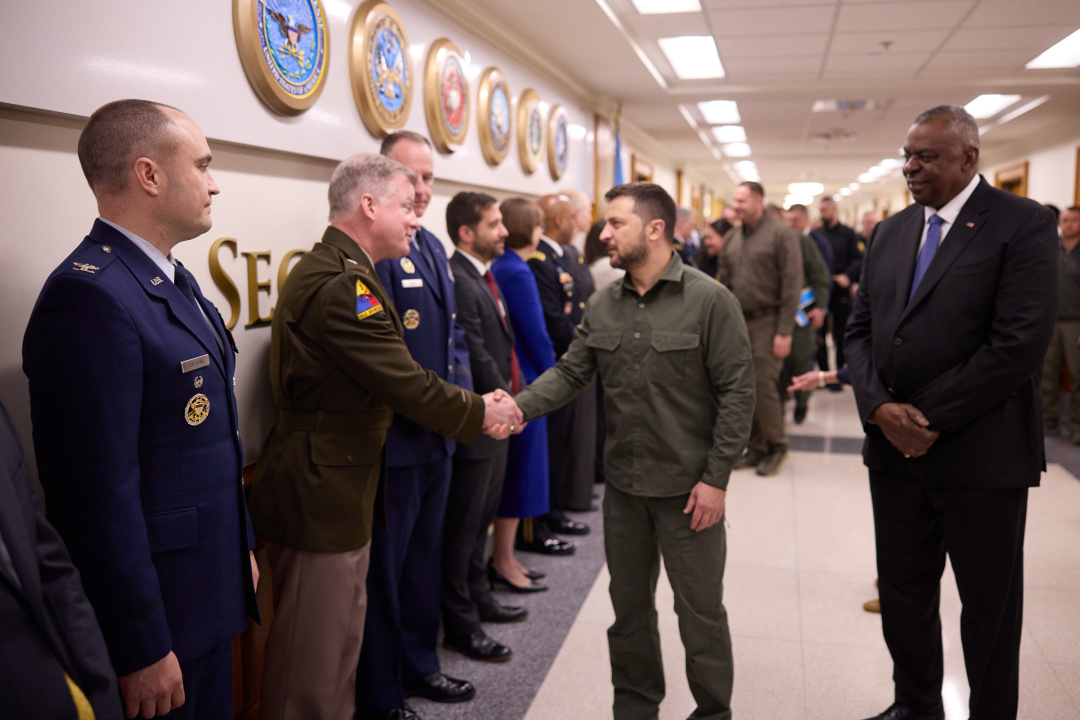
Oleksandr Kovalenko, a military observer at the Information Resistance group, made a similar point: "What kind of joint production of weapons can we talk about? There are not many details, it could be missiles, drones, and ammunition," the analyst said. "Also, let's not forget that this is about access to leading Western technologies. And it is about partnership, trust, and most importantly, confidence that Ukraine will win this war."
As for air defense systems, Mr. Kovalenko says their production is considered one of the most difficult.
"After the collapse of the USSR, our country is known in the world as one of the leading countries in the production of communication systems, radars, and electronic warfare. Yes, all these are elements of air defense, but we have not done a full-fledged production of air defense systems from scratch," the expert emphasizes.
Therefore, this is a very good prospect for increasing Ukraine's defense capability.
"But we need to look at this prospect realistically: until the war is over, we are unlikely to be able to talk about the production of air defense systems in Ukraine. At least because such an enterprise will immediately become the No. 1 target for enemy strikes. So for now, it looks more like a memorandum, but it is extremely promising and important for our country," Oleksandr Kovalenko said.
Meetings with Kissinger and Abdel Fattah al-Burhan are atypical, what do they indicate?
To a certain extent, it was a surprise: the President of Ukraine also met with the 56th Secretary of State, the famous diplomat, 100-year-old Henry Kissinger, who before the Great War was considered a consistent opponent of Ukraine's accession to NATO, and now is one of the lobbyists in favor of this issue. But what was this meeting about - was it just a symbolic gesture of politeness or was there a specific calculation?
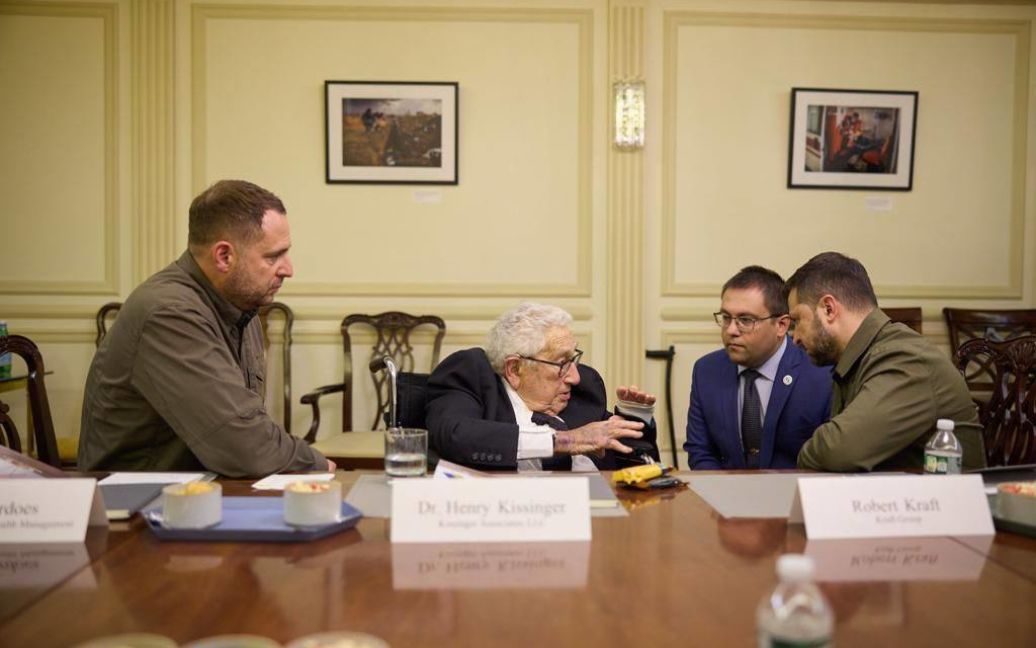
According to Yevhen Savisky, "the meeting with Kissinger was not a courtesy or a protocol event. It was a special meeting, the real details of which will never be disclosed. Kissinger is a "decades-long" friend of the current Chinese leader, Xi Jinping. It will be difficult for Ukraine to win the current war until Beijing stops helping Moscow directly or through the DPRK. And this is where Kyiv needs this "patriarch Kissinger".
The expert believes that what others may take years to accomplish, Kissinger will solve in one conversation.
"This is what was discussed at the non-public part of the meeting, as well as the fate of Russia and the future of Ukraine," the political expert added.
A similar opinion was expressed by Oleksandr Yusupov: "Kissinger is probably the most influential diplomat and negotiator of the last 50 years. Just look at his visit to Beijing this summer, where he was personally received by Chinese leader Xi and the country's defense minister, who meanwhile refused to meet with the head of the Pentagon. Therefore, the Ukrainian leader's contact with Kissinger is not only about exchanging views, but also about an additional negotiation channel with key capitals."
In addition, Kissinger is a pragmatic player, he is not seen by either the American establishment or world leaders as a staunch pro-Ukrainian or pro-Russian figure.
"And now he supports Ukraine's accession to NATO, which makes him useful for Kyiv in convincing foreign governments of the need to repel Russia and make Ukraine a full-fledged part of Western alliances," Mr. Yusupov emphasized.
Another atypical meeting was held by Zelensky with the Chairman of the Sudanese Sovereign Council, Abdel Fattah al-Burhan, on his way home, at Shannon Airport (Ireland). Importantly, it took place against the backdrop of Western media reports about the alleged involvement of Ukrainian special services in a series of strikes on the remnants of the Wagner PMC in Africa. What does this mean?
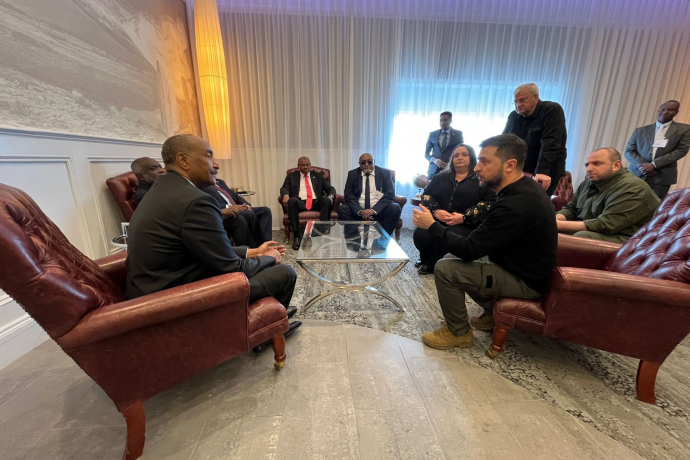
"Zelensky's meeting with the Sudanese leader hints at Ukraine's involvement in the recent strike against militants affiliated with the Wagner PMC. This operation, if it was indeed carried out by Kyiv, is a signal that the Russian-Ukrainian war has gone beyond the borders of the two countries to the global level, which means that Ukraine will now fight Russian influence around the world not only through diplomatic means," Oleksandr Yusupov believes.
Therefore, the expert emphasizes, we should not be surprised if we read news about strikes by unknown drones on the bases of the Wagnerites or their allies in Syria, Mali, Libya, and the Central African Republic, and then see photos of Zelensky's meeting with leaders of African or Middle Eastern countries.
"Moreover, after the death of Prigozhin, the Wagner PMC is in big trouble, which gives Kyiv even more opportunities to squeeze the PMC out of the states where it is present," Mr. Yusupov added.
And this is Yevhen Savisko: "Thanks to the efforts of the Ukrainian special services, Ukraine is finally entering Africa. But not as a colonizer or a supplicant for help, but as a strong and active ally. This is what the meeting of the President of Ukraine with the Chairman of the Sovereign Council of Sudan proves. And this is just the beginning."
In his turn, Oleksandr Kovalenko is the first to ask a question: "Has anyone said that Ukraine has no possibility to carry out certain operations far beyond the borders of Ukraine, of course, if they are coordinated and do not violate the law?"
Specifically in the case of Sudan...
"We can say that Wagner and the so-called local rebels tried to change the government in this country in a hybrid way. Obviously, Ukraine helped, especially since Ukraine already has quite a serious experience in dealing with various hybrid threats from the Russian Federation," summarized the observer of the Information Resistance group.
Myroslav Liskovych, Kyiv

